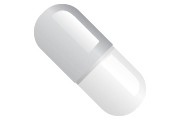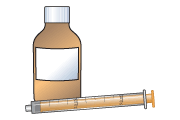Oseltamivir for influenza (flu)
This leaflet is for parents and carers about how to use this medicine in children. Our information may differ from that provided by the manufacturers, because their information usually relates to adults. Read this leaflet carefully. Keep it somewhere safe so that you can read it again.
Name of medicine
Oseltamivir
Brand name: Tamiflu
Why is it important for my child to take Oseltamivir?
Oseltamivir may be prescribed to help protect your child from becoming unwell if someone they have close contact with has flu, particularly if your child already has a long-term illness. It may also be prescribed to help your child recover from the flu. Your doctor will tell you how long you need to give oseltamivir for.
What is Oseltamivir available as?
- Capsules: 30 mg, 45 mg, 75 mg
- Liquid medicine (suspension): 30 mg in 5 mL
When should I give Oseltamivir
For the prevention of flu
- Oseltamivir is usually given once each day. This can be in the morning or evening.
For the treatment of flu
- Oseltamivir is usually given twice each day, once in the morning and once in the evening. Ideally, these times are 10–12 hours apart, for example can be given some time between 7 and 8 am, and between 7 and 8 pm.
Give the medicine at about the same time(s) each day so that this becomes part of your child’s daily routine, which will help you to remember.
How much should I give?
Your doctor will work out the amount of Oseltamivir (the dose) that is right for your child. The dose will be shown on the medicine label.
How should I give Oseltamivir?

Capsules
- Capsules should be swallowed with a glass of water, juice, or squash. Your child should not chew the capsule. You can open the capsule and mix the contents with a small amount of soft food such as yogurt, honey or jam. Make sure your child swallows it straight away, without chewing.

Liquid suspension
- Shake the medicine well.
- Measure out the right amount using an oral syringe or a medicine spoon. You can get these from your pharmacist. Do not use a kitchen teaspoon as it will not give the right amount.
- If your child does not like the taste you can measure out the medicine as above and mix it with a small amount of apple sauce or strong squash.
- Your child should swallow it all straight away.
When should the medicine start working?
If you are giving oseltamivir to your child to prevent flu, you may not notice any difference in your child, although the medicine will still be working. Continue to give the medicine to your child so that they do not become unwell.
If you are giving oseltamivir to your child to treat flu, they should begin to feel better after 2–3 days. You should continue to give the medicine for as long as your doctor has told you to, even when your child starts to feel better. Your doctor will tell you how long to give oseltamivir for
What if my child is sick (vomits)?
- If your child is sick less than 30 minutes after having a dose of Oseltamivir, give them the same dose again.
- If your child is sick more than 30 minutes after having a dose of Oseltamivir, do not give them another dose. Wait until the next normal dose.
If your child is sick again, seek advice from your family doctor, nurse, pharmacist, or hospital. They will decide what to do based on your child’s condition and the specific medicine involved.
What if I forget to give it?
If you normally give it once a day in the morning, give the missed dose when you remember during the day.
If you normally give it once a day in the evening, if you remember before bedtime, give the missed dose. If you remember after this, you do not need to wake your child up to give them the missed dose. You can give the missed dose in the morning, as long as this is at least 8 hours before the evening dose is due.
If you usually give it twice a day: If you remember up to 4 hours after you should have given a dose, give your child the missed dose. For example, if you usually give a dose at about 7am, you can give the missed dose at any time up to 11am. If you remember after that time, do not give the missed dose. Give the next dose as usual.
Never give a double dose of Oseltamivir.
What if I give too much?
If you think you may have given your child too much Oseltamivir, contact your doctor or local NHS services (details at end of leaflet). Have the medicine or packaging with you if you telephone for advice.
Are there any possible side effects?
We use medicines to make our children better, but sometimes they have other effects that we don’t want (side effects).
Side effects you must do something about
If your child has any of the following, contact your doctor straight away or take your child to hospital:
- irregular heart beat or fast heart beats (your child
may say that their heart is racing or feels fluttery) - yellowing of the skin or whites of eyes (jaundice)
- problems with vision, or painful red eyes
- fever (temperature above 38°C) and rash or mouth ulcers
- becoming muddled or disorientated (confusion).
Other side-effects you need to know about
Your child may get some of the following side effects when they first start taking Oseltamivir. These usually wear off after a few days as your child gets used to the medicine. If they are still a problem after a week, or you are worried, contact your doctor but continue to give Oseltamivir.
They may get headaches.
Your child may get stomach ache or stomach cramps or feel sick (nausea) or be sick (vomit). Giving the medicine with some food or milk may help.
There may sometimes be other side effects that are not listed above. If you notice anything unusual and are concerned, contact your doctor. You can report any suspected side effects to a UK safety scheme at mhra.gov.uk/yellowcard
Can other medicines be given at the same time as Oseltamivir?
- You can give your child medicines that contain paracetamol or ibuprofen, unless your doctor has told you not to.
Check with your doctor or pharmacist before giving any other medicines to your child. This includes herbal and complementary medicines.
General advice about medicines
- Try to give medicines at about the same times each day, to help you remember.
- Only give this medicine to your child. Never give it to anyone else, even if their condition appears to be the same, as this could do harm.
- If you think someone else may have taken the medicine by accident, contact your doctor or NHS local services (details at end of leaflet) for advice.
- Make sure that the medicines you have at home have not reached the ‘use by’ date on the packaging. Give old medicines to your pharmacist to dispose of.
Where should I keep this medicine?
- Make sure that children cannot see or reach the medicine.
- Keep the medicine in the container it came in.
- Capsules can be stored at room temperature.
- Keep the liquid suspension medicine at room temperature (not over 25°C) or in the fridge (2–8°C). It should not be kept for longer than 17 days after the bottle has been opened.
Who to contact for more information?
Your doctor, pharmacist or nurse will be able to give you more information about Oseltamivir and about other medicines used to prevent or treat flu.
England: NHS 111
Tel 111
www.nhs.ukScotland: NHS 24
Tel 111
www.nhs24.scotNorthern Ireland: NI Direct
Wales: NHS 111 Wales
Tel 111
www.111.wales.nhs.ukCopyright disclaimer
Version [2]. © NPPG, RCPCH and WellChild, all rights reserved. Review by June 2017.
The primary source for the information in this leaflet is the British National Formulary for Children. For details on any other sources used for this leaflet, please contact us through our website, www.medicinesforchildren.org.uk.
We take great care to make sure that the information in this leaflet is correct and up-to-date. However, medicines can be used in different ways for different patients. It is important that you ask the advice of your doctor or pharmacist if you are not sure about something. This leaflet is about the use of these medicines in the UK, and may not apply to other countries. The Royal College of Paediatrics and Child Health (RCPCH), the Neonatal and Paediatric Pharmacists Group (NPPG), WellChild and the contributors and editors cannot be held responsible for the accuracy of information, omissions of information, or any actions that may be taken as a consequence of reading this leaflet.
